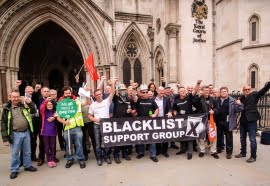We publish here the latest updates from the Blacklist Support Group, who have rejected attempts by blacklisting firms to provide compensation and are instead taking the major construction companies to court. Blacklisted workers, supported by the trade unions, are demanding jobs and an end to all blacklisting, and that these firms be punished for their illegal activities.
We publish here the latest updates from the Blacklist Support Group, who have rejected attempts by blacklisting firms to provide compensation and are instead taking the major construction companies to court. Blacklisted workers, supported by the trade unions, are demanding jobs and an end to all blacklisting, and that these firms be punished for their illegal activities.
Over 30 lawyers including the superstars of the legal profession, and nearly 50 blacklisted workers and their supporters packed into the snug Court 65 at the Royal Court of Justice to hear the blacklisting High Court claim of Acheson (& others) v Sir Robert McAlpine Limited (& others). There were not enough spaces and the clerk of the court had to bring in additional folding chairs for claimants to sit in the walkways but even then others could not get into the courtroom.
Up until this point every blacklisting case has been individual workers seeking individual redress at an employment tribunal about specific incidences of dismissal or victimisation. Yesterday the lawyers for the claimants – Hugh Tomlison QC (Guney Clark & Ryan solicitors), John Hendy QC (UNITE), Guy Vassall-Adams (GMB), Matthew Nicklin (UCATT) asked the Court to agree a Group Litigation Order (GLO) to allow all of the cases for the blacklisted workers to be heard together against all of the blacklisting companies. The Senior Master Leslie granted the Group Litigation Order. This effectively means that the entire construction industry is now on trial for blacklisting.
Both sides now have to draw up a list of key individuals from which test cases will be heard in full trial. The next court date 1st October 2014 and the full trial should start a few months afterwards. There are numerous legal strands to the High Court including conspiracy, defamation, human rights and breaches of the Data Protection Act. The prospects of industry grandees such as Cullum McAlpine plus ex-undercover and serving police officers being grilled by QCs at the High Court will turn this into a show trial.
Steve Acheson, blacklisted electrician, lead claimant in the High Court trial and chairman of Blacklist Support Group said:
“Time is running out for the blacklisting multinationals, who over a period of decades have deliberately and systematically set out to ruin our working lives. They may think that because they are rich and powerful that they are above the law. But those of us who have seen our families suffer, were never prepared to let this human rights abuse go unaccounted for. Blacklisted workers have fought for over five years but finally these directors are going to have to face the music. We hope the QCs put them to the sword. It’s less than the wretches deserve.”
Message to Balfour Beatty, Carillion, Costain, Kier, Laing O’Rourke, Sir Robert McAlpine, Skanska UK and Vinci PLC from the Blacklist Support Group:
“You know where you can poke your four grand compensation – see you in court.”
Bosses of blacklisting firms plus the lawyers responsible for the compensation scheme to give evidence to MPs:
Nick Pollard, CEO Balfour Beatty
Andrew Ridley-Barker, Managing Director VINCI Construction UK
Callum Tuckett, Group Finance & Commercial Director, Laing O’Rourke
Richard Slaven, Partner, Pinsent Masons (lawyer responsible for the Blacklist Compensation Scheme)
The blacklisting compensation scheme has already been condemned by the Scottish Affairs Select Committee, who in a recently published interim report called on the firms to pay compensation, but only with the agreement of the unions and blacklisted workers. Despite giving assurances to the MPs, the firms launched the scheme unilaterally. This should be a very interesting evidence session.
The blacklisting compensation scheme has also been condemned in the Scottish parliament with the following motion being submitted by Neil Findlay MSP:
Motion S4M-10552: Neil Findlay, Lothian, Scottish Labour, Date Lodged: 08/07/2014
Unions Reject Blacklisting Compensation
“That the Parliament condemns the decision by Balfour Beatty, Carillion, Costain, Kier, Laing O’Rourke, Sir Robert McAlpine, Skanska UK and Vinci Plc to launch the construction workers compensation scheme at this time; calls on these companies to withdraw this scheme and get back to meaningful negotiations with the trade unions representing the victims of blacklisting, and calls on the Scottish Government to stop awarding public sector contracts to companies with any involvement in blacklisting until they apologise to victims and make appropriate compensation.”
Supported by MSPs: David Stewart, Elaine Smith, Graeme Pearson, Jackie Baillie, Anne McTaggart, Cara Hilton, Margaret McDougall, Elaine Murray, James Kelly
Westminster MPs at the Scottish Affairs Select Committee investigation into blacklisting in the construction industry have been told by unions that the blacklist compensation scheme launched a week ago is “just a cynical public relations exercise”.
Justin Bowden, national officer for GMB, Gail Cartmail Assistant General Secretary UNITE, Steve Murphy UCATT general secretary gave evidence to the Select Committee investigation and identified public sector projects across the UK including the NHS where blacklisting was still taking place.
On compensation levels, Gail Cartmail told MPs that the payments being offered by the compensation scheme were “nowhere near enough” and the scheme was sending out incorrect information to those affected. Justin Bowden said that because the compensation scheme takes no account of defamation or impact on family life, that lawyers have indicated that most awards at the High Court are likely to be five times higher than the payments being offered by the employers scheme. Many blacklisted workers would expect to be awarded far in excess of £250,000 at the High Court whereas the vast majority of people on the compensation scheme would only receive between £4,000 – £20,000.
MPs were told that getting blacklisted workers back into employment on building sites was key to any kind of justice. Gail Cartmail said that the firms involved with the Consulting Association blacklist were still refusing to even discuss any scheme that would give blacklisted workers jobs on building sites. Steve Muprhy told the Select Committee that the firms were not even prepared to issue a statement stating that they of employing workers.
Ian Davidson MP, chair of the Select Committee said the firms are “not genuinely apologising neither are they genuinely self-cleansing” and suggested the the compensation scheme should be used as a method to give blacklisted workers an “interim payment” that should be increased if the High Court makes higher awards.
The union leaders also identified the employment agency Atlanco Rimec as an organisation that was carrying out “contemporary blacklisting” including in the NHS. Justin Bowden told MPs that many of the companies that subscribed to the Consulting Association blacklist were also clients of Atlanco Rimec. The unions had prepared a dossier about the organisation and read out sections of their evidence that alleged that the employment agency kept its own blacklist of workers involved in union activity.
Bosses of the blacklisting firms Balfour Beatty, Vinci and Laing O’Rourke and lawyers from Pinsent Mason who drew up the compensation scheme are giving evidence to the Select Committee this coming Wednesday afternoon.
Video footage of the evidence session (blacklisting section starts at 15:46)
Dave Smith, secretary of the Blacklist Support Group said after the evidence session:
“The trade unions have ripped the firms blacklisting compensation scheme apart and left it in tatters. No-one has been taken in by the PR stunt intended to divert attention away from the High Court trial. The MPs on the Scottish Affairs Select Committee have done a sterling job in exposing the blacklisting scandal and the recommendations in their cross party report should form the basis of government policy. This is a once in a generation opportunity to clean up the cesspit of human rights abuse presented as industrial relations in the building industry – we will continue fighting until we get justice”.






